Alumni q
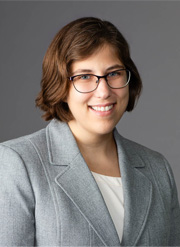
2024
Emily Cybulla
What sparked my interest?
My interest in M.D./Ph.D. dual-degree programs began while I was an undergraduate student at Loyola University Chicago. Already planning on medical school, I found that I enjoyed my organic chemistry course work so much that I wanted to engage in research at the intersection of medicinal synthetic chemistry and biochemistry/molecular biology. After starting on a research project, and with the support of lab and life mentors, I discerned that my career goals in clinical medicine and scientific research best aligned with a combined M.D./Ph.D. training program. Since Loyola is a Jesuit institution with a specific focus on social justice and service, I was drawn to SLU's Jesuit mission and values, including a commitment to cura personalis. I also loved the smaller size of SLU's M.D./Ph.D. program, which allowed me to develop relationships with peers, faculty, and program leadership. I was looking for a program that was a true community.
How did I decide on which lab to join? What did I accomplish in the department?
I joined a lab primarily based on the people. While I wanted a cancer-related research project, I prioritized the lab culture, opportunity for team science, PI leadership style and engagement, and available resources/funding. I initially thought that I wanted to complete my graduate work in a pharmacology lab, based on my experience with organic chemistry research, but I was fascinated with the techniques and scientific questions being asked by some labs in the Department of Biochemistry and Molecular Biology. After two rotations, I joined Alessandro Vindigni's group. During my second year of graduate school, our lab moved from SLU to Washington University School of Medicine in St. Louis. I moved with the lab to complete my Ph.D. and was a visiting student at WashU for several years before returning to SLU for my clinical rotations. In addition to publishing several publications and reviews, I worked on some graduate student wellness initiatives and was involved with organizing professional development sessions. I was also fortunate to be awarded an F30 fellowship through the NIH for my primary Ph.D. project. I loved building relationships with scientific collaborators and physician scientists who would become mentors.
My plans for the future?
I hope to continue on the physician scientist career path, integrating my passions for clinical medicine and cancer research. I will be joining the Physician Scientist Training Program (PSTP) at Ohio State University, and I plan to complete Internal Medicine residency, followed by a fellowship in oncology and post-doctoral research. My long-term goal is to treat patients with breast cancer as an oncologist and to develop an independent research career in translational genomics and precision cancer medicine.
My experience at SLU?
SLU's M.D./Ph.D. program is a community, a place where I grew professionally and personally, a place that I am grateful to have called home for eight years. The people here, the students, the leaders and administrators, and the faculty and researchers, are bright, thoughtful, kind, and driven to cultivate gifts that meet a need in the world. This training path is long and often challenging, but I would do it again at SLU.
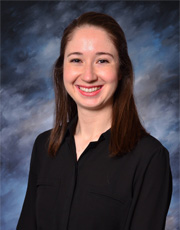
2024
Jessica Bourque
What sparked my interest?
I always enjoyed learning about biology and realized at a pretty young age that I wanted to be a doctor. However, it was not until college when I performed research during the summers as part of my scholarship requirements that I realized my passion for biomedical research. Once I became more involved in my project and started designing my own experiments, I realized how much I enjoy the ins and outs of the research process and could see a future for myself combining my passions of patient care and scientific inquiry.
How did I decide on which lab to join? What did I accomplish in the department?
When I came to SLU, I was interested in the intersection of infections and immunology. I met with multiple researchers in the Department Molecular Microbiology and Immunology and decided to join the lab of Dr. Daniel Hawiger. From our meetings and my rotation in the lab, I could tell that he would be a great mentor and the right personality fit for me. This turned out to be very true, and my mentor was very invested in my success! During my time in the lab, I studied how a subset of dendritic cells respond to inflammation and how this contributes to effective adaptive immune responses, with my findings being published in multiple first-author primary research and review articles.
My plans for the future?
I am very excited to be heading to Boston for residency in Internal Medicine at Massachusetts General Hospital! I matched into the Stanbury Physician-Scientist Pathway, which will provide support for me as I continue my clinical and research training. I plan to pursue fellowship in Allergy and Immunology with the goal of becoming a physician-scientist running a lab that studies basic immunology.
My experience at SLU?
SLU has been such a wonderful place to spend the many years of M.D./Ph.D. training! The clinical and research environments are very supportive throughout all phases of our training, and our program director Dr. McHowat and program coordinator Nicole Clark do an excellent job running the M.D./Ph.D. program and creating a great culture among the students. I’ve met so many great people here who have made my experience here at SLU a great one!
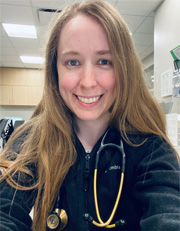
2024
Meghan Murray, M.D., Ph.D.
What sparked my interest?
I have wanted to do biomedical research from an early age. During college, I was active in an international service organization which provided me with my first patient interactions. Through these experiences, I realized that patient care could provide a profoundly meaningful dimension to my career that benchwork research alone could not provide.
How did I decide on which lab to join?
I completed my Ph.D. in the Department of Pharmacology and Physiology. I joined a nuclear receptor pharmacology lab, because of the obvious translational relevance of the projects. It was exciting to work with an interdisciplinary team on a variety of pharmaceutical development projects.
What did I accomplish in the department?
Earned with distinction, I completed a dissertation entitled "Synthetic Ligands Targeting ROR and REV-ERB to Treat Inflammatory and Metabolic Disease States." The professional highlight of my graduate school experience was publishing a first author paper in Nature Communications. The paper investigated the structural basis of synthetic agonist activation of the nuclear receptor REV-ERB.
My plans for the future?
I am excited to have matched the psychiatry residency program at Washington University in St. Louis School of Medicine. I look forward to clarifying my subspecialty interests, while taking advantage of the incredible clinical and research opportunities offered by my new program.
My experience at SLU?
The greatest assets of the SLU M.D./Ph.D. program are the people affiliated with it. The dual-degree program is a long journey, and it has been an absolute joy to have this group of students accompanying me on that journey. Additionally, I am grateful for our program leaders, Dr. McHowat and Nicole. They are highly supportive of the students both personally and professionally. They are powerful advocates for the students in our program, and they are always seeking trainee feedback to make our program even better!
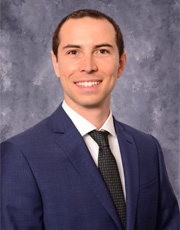
2024
Valerio Rasi, M.D., Ph.D.
What sparked my interest?
While participating in biochemistry research at the University of Florida, I realized the great impact that biomedical research brings to human medicine. While a physician can treat one patient at a time, as a researcher I was able to make contributions that would influence many more individuals. I thus decided to apply to M.D./Ph.D. programs that would support my goal of treating patients while advancing medical research.
How did I decide on which lab to join? What did I accomplish in the department?
Given my strong interest in biochemistry and immunology, I decided to join Dr. Daniel Hoft’s laboratory. Dr. Hoft not only is a tremendous physician scientist that treats and researches pathogens, but he is also the head of the Vaccine center through the VTEU (a consortium funded by the NIH at 10 elite medical centers). My project looked at the protein Granzyme A and its interaction with human macrophages infected with Mycobacterium tuberculosis. In my thesis work I discovered multiple pathways activated by this protein. During my Ph.D., I received the prestigious predoctoral fellowship F30 from the NIH through the National Heart Lung Blood Institute (NHLBI) that funded part of my Ph.D. and M.D. degrees. My discoveries culminated in multiple first-author publications in high impact factor peer-reviewed journals, multiple presentations at local and national conferences, and a utility patent.
My plans for the future?
I am happy to say that I matched at Baylor College of Medicine in Houston, Texas! Moreover, I am one of two students that matched directly in the MeRIT pathway, which is a physician scientist training program. During my residency, I will get to work at MD Anderson, which is the number one oncology hospital in the world! I also have guaranteed acceptance into fellowship in hematology and oncology. After fellowship, I plan to practice as an oncologist with an interest in translational science medical projects, looking at the role of the immune system in cancer biology.
My experience at SLU?
I feel fortunate to have obtained my M.D./Ph.D. education at Saint Louis University. My mentor, Dr. Hoft, was instrumental in obtaining my numerous achievements, and I always felt supported. On the medical campus, there is a wealth of amazing professors and mentors that allowed me to become a confident researcher and talented clinician. I now feel prepared for my next steps on my journey in research and medicine.
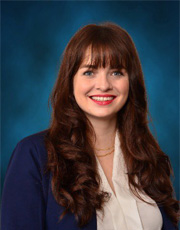
2023
Michelle Bach, M.D.,Ph.D.
What sparked my interest?
I fell in love with science during college when I was a microbiology intern at the Centers for Disease Control and Prevention. At the CDC, I had the good fortune to work on the MenAfriVac project, which brought meningococcal vaccines to parts of Africa where bacterial meningitis is endemic. While this was an amazing experience, I felt frustration that the vaccine had been available for decades before it was made widely available to patients. I realized that scientific innovation is vital but not sufficient. I decided to pivot to work in medical ethics. At the time I was applying, SLU offered the only fully funded M.D./Ph.D in bioethics. So I moved to St. Louis to start a career in medicine and bioethics!
What did I do in the department?
The rigorous coursework in the Health Care Ethics program allowed me to explore many different facets of bioethics. I discovered a passion for postmodern philosophy and the philosophy of medicine. I spent my dissertation time developing expertise in psychiatric ethics and the philosophy of psychiatry.
My plans for the future:
I matched my top choice, Emory University's Research Track in Psychiatry. I am excited to spend time developing clinical skills as a psychiatrist while also having ample research time. I plan to study public trust in neuromodulation and interventional psychiatry technologies.
My experience at SLU:
I think it's fair to say that the Health Care Ethics Department at SLU is one of the best in the country! My clinical training has also been excellent, and I feel well prepared to be a true physician-scholar. I love that our program is small. No one falls through the crack and every trainee is valued here.
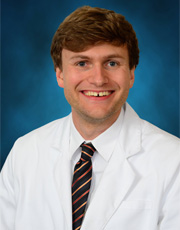
2022
Daniel Pike M.D., Ph.D
What sparked my interest?
I was always been interested in science, especially biochemistry since high school, and knew I wanted to be a scientist involved in research. In college, though, I realized that I wanted any science that I was involved in to be focused on improving the lives of those around me. Medicine and biomedical research seemed like an obvious path in which I could treat patients directly and also help treat patients I would never meet personally, either in the future or around the country/world through research.
How did I decide on what lab to join?
I was extremely fortunate to join Dr. Dave Ford's lab in biochemistry. My lab selection was based on a combination of doing research I was interested in, personality fit (with the mentor and with all the people in the lab), and the mentor's experience with training Ph.D. and M.D./Ph.D. students. Dr. Ford was a great intersection of all three of those criteria, and I loved being in his lab. I rotated through his lab the first summer, and I had a great experience and knew that it would be a good fit. My advice to incoming or early-year M.D./Ph.D. students is that the personality and mentor experience are just as important as interest in the research.
What did I do in lab?
My project was exploring the role of myeloperoxidase-derived chlorinated lipids in sepsis. I adapted a rat model of sepsis in the lab and characterized the timing and localization of these lipid species in plasma and other organs. I also determined the effect of exogenous chlorinated lipids in healthy rats. Additionally, the Ford lab provides plenty of opportunities to collaborate with other labs at SLU and across the country, so I was able to participate in many collaborative lipidomic studies.
My plans for the future
I am thrilled that I just matched into the Pediatric Residency at WashU/St. Louis Children's Hospital. I will participate in their Pediatric Physician Scientist's Training Program where I will be able to receive additional research time and training throughout residency and fellowship.
My experience at SLU
If you include undergrad, I've been at SLU for 12 years, and I've loved every bit of it. The SLU M.D./Ph.D. program has provided me with the clinical training I need to succeed, the research training and opportunities that will give me a leg up in starting my career as a physician-scientist, and relationships that I'll treasure for a lifetime. Go Bills!
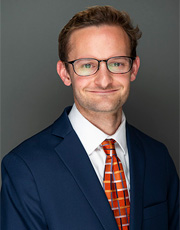
2022
Nick Steinauer M.D., Ph.D.
What sparked your interest to become an M.D./Ph.D. student?
While I entered undergraduate training with the strong notion I wanted to one day be a physician, I found myself attracted more to the basic sciences, especially molecular biology and chemistry. I got involved in biochemistry research developing deoxyribozymes and felt a lot of excitement in the process of experimenting, troubleshooting and contributing some small piece to new knowledge. I didn’t think I’d be satisfied with the traditional career in medicine and wanted to pursue something more mechanistic than clinical research.
How did you decide which lab to join?
I chose to work in Jinsong Zhang’s lab, which studies both wild-type and mutant transcriptional/epigenetic regulators in hematopoiesis and leukemia. The lab combined very mechanistic “wet-lab” methods with high-throughput sequencing methods (especially ChIP- and RNA-Seq). I believe high-throughput sequencing will play an increasingly important role in biomedicine, so I made a very conscious decision to join a lab where I could learn these skills.
What did you do in the lab?
Initially, made a lot of very ugly western blots and designed bad PCR primers. My thesis project characterized the functional effects of a transcriptional corepressor called ETO2, which serves as a linker between many hematopoietic transcription factors and the enzymes required to condense surrounding chromatin. We found that a unique transcriptional isoform was strongly correlated with relapse and stem cell signatures in many subtypes of acute myeloid leukemia. We also showed that ETO2 promotes closed chromatin at many genomic sites that must be open to fully bind the retinoic acid receptor, and thereby decreases retinoic acid responsiveness and differentiation in myeloid precursors.
What are your plans for the future?
I will be moving to Rochester, Minnesota to begin combined Internal Medicine/ Hematology/Oncology training at Mayo Clinic. The program offers protected research time to complete post-doc training and establish an independent research career. I’ like to research how intratumoral epigenetic heterogeneity contributes to disease phenotypes and resistance in hematologic malignancies.
What has been your experience at SLU?
Counting both undergraduate and M.D./Ph.D. training, I’ve been at SLU for 12 years – an equivalent amount of time spanning kindergarten to high school senior, and I can say the amount of personal change has been roughly equivalent as well. I started medical school thinking I knew a lot of things and being scared to ask about what I didn’t. Now, I know how much I don’t know, with the ability to ask dumb questions and form relationships in the process.
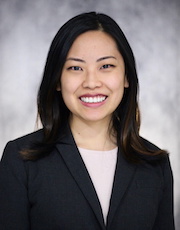
2021
Catherine Cai, M.D., Ph.D.
What sparked your interest to become an M.D./Ph.D. student?
I started working in a genetics lab at Emory University for my undergraduate research
thesis and realized that I loved this new method of learning. I was drawn to the idea
that I could figure out how to test and answer my own questions. Scientific discovery
also seemed like one of the widest-reaching ways to positively impact patients, even
though that impact can sometimes feel abstract.
How did you decide which lab to join?
I had been interested in infectious diseases and how they burden communities both
locally and globally for quite some time, so I was naturally interested in the vaccine
development work that Dr. Hoft and his group were doing, as well as Dr. Hoft's strong
training record for M.D./Ph.D. students.
What did you do in the lab?
I studied the role of CD4+ T cells in generating protective immunity versus immunopathology
during infection with Trypanosoma cruzi, the parasitic cause of Chagas disease, in
the context of vaccine. At some point, I even did EKGs on mice.
What are your plans for the future?
I will be working hard at becoming the best internist that I can be through the Internal
Medicine residency training program at New York Presbyterian/Weill Cornell Medical
Center. After that, I will be doing an Infectious Diseases fellowship. Long term,
I look forward to a career that integrates translational research, patient care, and
global health.
What has been your experience at SLU?
I am proud of the work that we do here, both in terms of patient care and research.
The M.D./Ph.D. community is a small but intimate one.
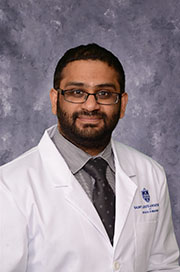
2019
Anit Behera M.D., Ph.D.
What sparked your interest to become an M.D./Ph.D. student?
My interest to become an M.D./Ph.D. student began during my final year in college
when I was working in a research lab. I was excited/committed to complete medical
school (as I was already involved with the combined B.S./M.D. pre-medical scholars
program at SLU) and decided to add a Ph.D. to satisfy my passion in research and teaching.
Dr. Andrew Lechner was the director at that time and he encouraged me to join SLU's
M.D./Ph.D. program.
How did you decide which lab to join for your Ph.D.?
I worked at the Center for Health Outcomes Research which conducts-and translates-research
into practices that improve health outcomes across patient populations. My area of
expertise in health outcomes primarily falls under applied biostatistics and research
methodology/design with a focus in clinical research. I decided to join SLUCOR as
I was interested in becoming a clinical physician-scientist and utilizing my skills/knowledge
as an outcomes researcher to directly impact my future ambitions as a clinician.
What did you do in the lab?
My responsibilities included providing professional scientific services at every stage
of the research project life-cycle, including study design and protocol development,
data collection, database design and management, statistical programming and analysis,
interpretation and reporting, and communication of results, and teaching courses provided
by the department.
What are your plans for the future? short term, long term?
I will be joining the University of Chicago as a resident-physician in Neurology.
Afterward, I am interested in completing a post-graduate fellowship in neuro-critical
care, vascular neurology, or interventional neurology. I eventually would like to
practice at an academic medical center.
What has been your experience at SLU?
Overall, my experience at SLU has been wonderful. I am grateful to the institution
for providing me the continuity from my undergraduate experience to my M.D./Ph.D.
training.
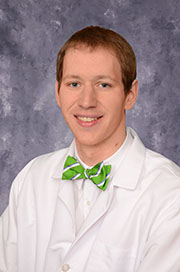
2019
Ray Kreienkamp, M.D., Ph.D.
What sparked your interest to become an M.D./Ph.D?
I was always interested in science, and I knew, going into medicine, that I wanted
to be a physician-scientist. I was interested in exploring the molecular basis behind
disease pathology and hoped that I eventually could help move us closer to cures for
various diseases.
How did you decide which lab to join?
I loved the department of biochemistry at SLU. They have an amazing group of faculty,
and Dr. Di Cera is an excellent chair. I had two great rotations in the department,
and I eventually chose to work in Susana Gonzalo's lab because she is a fantastic
mentor, and I thought it was an environment in which I could excel. She had some excellent
people in the lab, so I knew it would be a place where I could learn to do science
well.
What did you do in the lab?
I studied the molecular mechanisms driving Hutchinson-Gilford Progeria Syndrome (HGPS).
This devastating disease causes patient death in their early teenage years. This disease
is fascinating to study, because it is also thought that some of the things we learn
about HGPS might also be applicable to the normal aging process. When I came into
the lab, people were studying the role of vitamin D in being able to improve the phenotype
of HGPS cells, and we found that vitamin D was able to improve HGPS phenotype, particularly
DNA damage. Interestingly, our studies with vitamin D allowed us to uncover that replication
stress plays a significant role in generating the DNA damage that occurs in this disease,
and this DNA damage activates a cell-intrinsic interferon-like response which drives
inflammation and contributes to the detriment of these cells. This finding is significant
for the field, and opens a cascade of new pathways to target to improve cell and patient
phenotype. Further, I worked with a mouse model of disease. While previous researchers
had been unable to elucidate the reason for mouse death, we demonstrated that these
mice die from metabolic dysfunction, and supplementing these mice with a high-fat
diet extended lifespan more than any treatment to date. Further, these mice developed
phenotypes, previously unseen, that mirrored phenotypes seen in humans. As a result,
our studies opened the door for further exploration of the pathways driving these
problems in mice to determine if they have application to humans.
What are your plans for the future?
I will be a resident at St. Louis Children's Hospital in the department of pediatrics.
I love working with kids, and I hope to one day become a pediatric endocrinologist.
I hope, there, I will be able to see patients and also do research.
What has been your experience at SLU?
I have loved my experience at SLU. During my Ph.D. years, I felt incredible support
from my mentor, Susana Gonzalo, and my thesis committee. I learned a ton, and I feel
like I am well-equipped for a career in science. During my M.D. years, I felt like
I learned the skills necessary to be a great physician, and specifically a great pediatrician.
I love the pediatrics department at SLU, and there are a ton of great people there.
The M.D./Ph.D. program is strong, and I always enjoyed knowing everyone in the program.
We are a tight-knit group, and Dr. McHowat and Nicole were always there to help us
succeed.

2019
Andrew Jones, M.D., Ph.D.
What sparked your interest to become an M.D./Ph.D. student?
I enjoy many aspects of medicine. The puzzle of figuring out the diagnoses of an ill
patient and providing the correct treatment is both fun and challenging. Interacting
with and caring for patients in a person-to-person manner is very rewarding and is
the main reason I chose to pursue medicine. However, the excitement of new discoveries
in science and the challenge, intrigue and high level thinking involved process of
scientific research really drew me to pursue a Ph.D. in addition to an MD.
How did you decide which lab to join for your Ph.D.?
I had done a summer rotation in the lab of Daniel Hawiger M.D., Ph.D. in between the
first and second year of medical school and really enjoyed studying immunology and
immune regulation. The topic sparked my interest and the lab's work atmosphere was
a great fit for me personally. My mentor and I got along very well and it seemed that
we would be able to work well together. This ended up being very true and something
that was very important for my success. My mentor was also was very invested in ensuring
that both the lab and his students succeeded.
What did you do in the lab?
Broadly, I worked on immune regulation trying to understand how the immune system
prevents response to self and instead remain "tolerant" to self-antigens. More specifically
I studied the role of a transcription co-factor called Hopx in regulatory T cells
that are induced in the peripheral immune system. I also studied a type of antigen
presenting cells, dendritic cells, and their role in inducing tolerance to self. I
worked to further understand tolerogenic dendritic cells and identified an important
pathway used by these dendritic cells to induce regulatory T cells and immune tolerance
to self-antigens.
What are your plans for the future?
Short term - I will be doing residency in internal medicine at Washington University
Barnes Jewish Hospital. I matched into the PSTP program so I will be doing a fellowship
at Washington University as well but am currently undecided on which sub-specialty
of internal medicine to pursue. Long term - I would like to run a lab doing basic
immunology research and also see patients in a related clinical field. I am hoping
for my time to be split at about 80% research and 20% clinical time.
What has been your experience at SLU?
At Saint Louis University I have grown tremendously as a person, as a scientist and
as a soon-to-be health care provider. The faculty for both science and medicine have
been great teachers who have helped to fully prepare me for the next step in my career.
Fellow students at SLU are highly motivated and have helped to push each other to
pursue excellence but at the same time support each other through each step of training.
The wide range of clinical experience provided during medical training prepared me
well to work as an intern in the coming year.

2017
Robert Adams, M.D., Ph.D.
What sparked your interest to become an M.D./Ph.D. student?
In the med-school application process people would joke that M..D/Ph.D.s are for people
who can't decide what they want to do with their lives. There is some truth in this,
and during undergrad I was drawn toward caring for people, intrigued by the complexity
of the human brain and body, and in addition, I felt a commitment to academia and
research (i.e. extending the sum of human knowledge). After my M.D./Ph.D. training
I better understand the important role of a physician-scientist, which is more than
just a person who couldn't decide whether to do research or medicine.
How did you decide which lab to join for your Ph.D.?
Generally speaking, advice for picking a lab that is often given to students interested
in pursuing a Ph.D. is that you have to weigh three nearly equally important factors:
1) Interest in the current projects and direction of the lab, 2) Fit with the personality
and communication of the PI/mentor, and 3) Current and future funding for the lab.
Having all three is a perfect fit, and having two can lead to a successful and fulfilling
Ph.D., but it will have certain challenges. Having only one of those things is not
recommended.
I am interested in physiology and rehabilitation of the nervous system. Additionally, I have a background in engineering. The lab I worked with focused on the neurophysiology of synaptic transmission, mechanisms of peripheral nerve regeneration, and neural engineering of regenerative approaches.
What did you do in the lab?
During my initial summer rotation I joined a project looking at vesicle release for
synaptic transmission. I published these findings in Biophysical Journal. I then joined
the lab full time for my Ph.D. and shifted my focus on the use of electrical stimulation
for affecting and improving neural regeneration. More specifically I studied the effect
of electrical stimulation on peripheral neurons, and I studied approaches to optimize
these effects.
What are your plans for the future?
Short term: I will be joining the neurology residency program at Case Western.
Long term: I continue to love and feel committed to both caring for patients and for performing original research. I plan to conduct neurological research, possibly in neural regeneration and rehabilitation, while continuing to care for patients.
What has been your experience at SLU?
My experience has been excellent and is too extensive to do it justice in a written
response. I grew academically (becoming fluent in the languages of medicine and science),
professionally (learning to function well in complex teams with many goals and interests),
personally (getting married, evaluating life goals and personal purpose), emotionally
(through structured wellness and mindfulness classes as part of the curriculum which
extended to further extracurricular activities), and humanistically (volunteering
in the community as well as working with and trying to understand patients from broad
walks of life), to name a few.
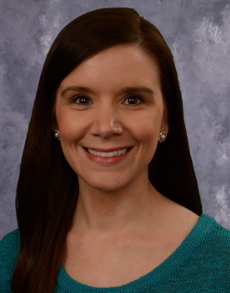
2016
Stephanie Jackson Cullison, M.D., Ph.D.
What sparked your interest to become an M.D./Ph.D. Student?
As a child, I always dreamed about becoming a doctor. I pursued an undergraduate degree
in biomedical engineering on a premed track to prepare me for this pathway. While
I was in undergrad, I had several research experiences that I really enjoyed, including
with physician-scientists conducting both clinical and basic research. I really admired
and respected the work that my mentors did. I was fascinated by their ability to ask
basic questions and translate that knowledge for patient benefit. When I learned about
the M.D./Ph.D. track, I thought it provided the best option to prepare me for a career
in which I could become the physician I always dreamed of being, while also bringing
in my newfound interest in research to expand my ability to help patients.
How did you decide which lab to join for your Ph.D.?
I thought a lot about what research was interesting to me when deciding what labs
to rotate in. I also considered the reputation of the lab, the mentor, the department.
In selecting a lab, I was advised that your relationship with the mentor is more important
than the specific project that you work on, but I think the combination is important.
After completing my training, I now know that to get the most out of your training,
you want to look for a mentor with experience and a good track record of publication
and funding. You want to make sure that the department has experience successfully
training M.D./Ph.D.s. The productivity of current and former lab trainees (M..D/Ph.D.
or otherwise) can be enlightening.
What did you do in the lab?
I employed a murine model of CD8+ T cell tolerance to explore the molecular pathways
that dictate T cell fate after engagement of self-antigen. Understanding these pathways
has implications for both autoimmunity and eliciting anti-tumor CD8+ T cell immunity.
My lab experience involved a variety of techniques including in vivo and in vitro
studies, flow cytometry and a variety of molecular techniques. We published our findings
in The Journal of Leukocyte Biology, Immunotherapy, and PLOS One.
What are your future plans?
I am starting a dermatology residency at the University of Pittsburgh Medical Center.
I currently plan to do a fellowship after I complete my general dermatology training,
but am still reflecting on which subspecialty will be the best fit. After training,
I hope to remain at an academic center and have a career that offers opportunities
to be involved in teaching and research.
What has been your experience with SLU?
I found the training environment at SLU to be one of the most supportive environments
I've ever been in! The leadership of the medical school were dedicated to ensuring
that students not only learned the art and science of medicine, but also maintained
well-balanced lives outside of the classroom/hospital. I found this support to be
invaluable while navigating the challenging and stressful pathway of medical training.
I also found the M.D./Ph.D. program leadership and my colleagues to be incredibly
supportive. There was always someone keeping a close eye out to make sure I met my
my milestones, remained on track to graduate in a timely manner, and most importantly,
had a little fun doing it!
Alumni Placements
- Internal medicine - Baylor College Medicine- Houston, Texas
- Psychiatry - SSM Health/Saint Louis University School of Medicine
- Internal medicine- Ohio State University Medical Center
- Internal medicine - Internal Medicine - Stanbury Physician Scientist Pathway- Massachusetts General Hospital
- Psychiatry- Washington University/ Barnes Jewish Hospital
- Psychiatry- Emory University Physician-Scientist Training Program
- Pediatrics - St. Louis Children's Hospital- Missouri
- Internal Medicine - Saint Louis University SOM- Missouri
- Internal Medicine - Mayo Clinic School of Grad Medical Education- MN
- Pediatrics - Indiana University SOM- Indiana
- Internal Medicine - New York Presbyterian/Weill Cornell Medical Center
- Pediatrics New York Presbyterian Children's Hospital/Columbia University Physician- Scientist Program
-
Internal Medicine - Barnes-Jewish Hospital
-
Internal Medicine - University of Nevada Reno School of Medicine
-
Pediatrics - St. Louis Children's Hospital
-
Neurology - University of Chicago Medical Center
- Otolaryngology - University of California-San Diego
- Neurology - Case Western University
- Pediatrics - University of Michigan, Washington University
- Dermatology - University of Pittsburgh
- Psychiatry - Saint Louis University
- Radiation Oncology - Emory University
- Pathology - University of Utah
- Obstetrics/Gynecology - Saint Louis University
- Internal Medicine - Mayo Clinics, Rochester and Saint Louis University
- Anesthesiology - University of Colorado
- Pediatrics - University of California Los Angeles
- Surgery - Vanderbilt University
- Dermatology - University of Colorado
- Internal Medicine - Saint Louis University, Johns Hopkins University
- Radiation Oncology - University Texas Southwestern
- Obstetrics/Gynecology - Washington University
- Medicine/Pediatrics - Vanderbilt University
- Dermatologic Pathology -Saint Louis University, University of Texas Southwestern
- Radiation Oncology - Washington University
- Pediatric Hem/Oncology - Stanford University
- Anesthesiology - Columbia University
- Internal Medicine - Washington University
- Neurological Surgery - Cleveland Clinics
- Internal Medicine - Mayo Clinics, Rochester
- Duke University